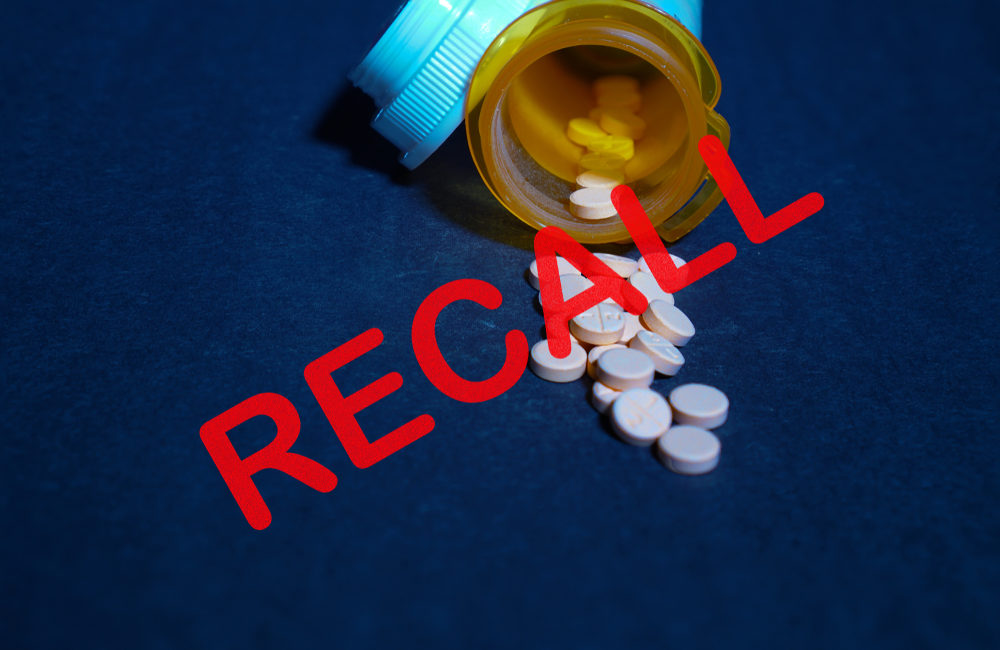If one of your prescriptions is included in a medication recall, you may be unsure of what to do. At Drug and Device Watch, we want our readers to be informed and feel confident about their medications and medical devices. Furthermore, we want you to understand potential dangers.
Here is some helpful information about what you should do if your medication is included in a recall.
Verify Your Prescription is Included in the Medication Recall
If your prescription has been recalled, the first thing you should do is verify that your particular prescription is included. Prescription medications are often manufactured at different facilities, at different times, and in different batches. That means that certain lots or batches of medication may be dangerous while others will not be.
To verify if your prescription is included in a medication recall, you can visit the manufacturers website or the FDA’s website, or you can call your pharmacy. You may need to contact your pharmacy for manufacturer and lot or batch information before looking up your prescription online.
Find out the Reason for the Medication Recall
The FDA issues medication recalls for several reasons. The most common are:
- Health hazards
- Mislabeling
- Improper labeling
- Contamination
- Drugs packaged in the wrong containers
- Poor manufacturing processes
Once problems are apparent, the FDA will issue a recall. The recall will be classified based on the severity of the risk to patients. The FDA has the following classes for recalls:
- Class I – The risk of health problems or death is high. This is the most serious classification of recall.
- Class II – The risk of health problems is slight, but there is a risk of temporary health problems. This class is the most common, and while not as serious as a Class I, they should be taken seriously.
- Class III – There is little risk of health problems, but there are violations of manufacturing or labeling laws. This is the least serious class of medication recall.
Don’t Stop Taking Your Medications
When your medication is subject to a recall, it is tempting to stop taking it immediately. However, it is important to talk to your doctor before stopping any medication. There are many reasons why recalls occur, so it may be in your best interests to continue taking your medication rather than stopping.
Suddenly stopping a medication can certainly be dangerous or even life-threatening. If you cannot reach your doctor immediately, contact your pharmacist to see if there is an alternative manufacturer or lot that you can take.
Be Aware of Changes, Side Effects, or Other Problems
If your prescription medication is subject to a recall, be aware of any changes in your health. Furthermore, if you notice adverse side effects, new symptoms, or other problems, contact your doctor right away. You should also be aware of things like an odd smell, evidence of tampering, or an unusual look to the medication itself.
Sometimes medications are a different shape or color depending on the manufacturer. If you are concerned, certainly contact your pharmacist right away.
Properly Dispose of Recalled Medications
If your prescription is subject to a recall and your doctor advises you to stop taking it, you may need to dispose of whatever you have left. You should never keep recalled medications in your home, as you or someone else could take them accidentally. There are several ways that you can properly dispose of medications, including:
- Locate an authorized take-back site
- Find out if local law enforcement offer prescription drop off or recycling
- Flush pills down the toilet
- Discard creams or sprays in your trash
Check your prescription information to see if there are any specific guidelines for proper disposal. You can also ask your doctor for advice.
Report Adverse Events
The FDA offers MedWatch: The FDA Safety Information and Adverse Event Reporting Program. Through this program, you can report side effects, illness, or injury you have suffered as a result of medications or medical devices. These reports are important to helping the FDA understand how consumers are responding to certain products.
By reporting adverse events, you are helping the FDA understand side effects and risks, and also could be helping prevent other patients from suffering the same side effects you have.
Contact a Medication Recall Attorney
Sometimes, medication recalls have little impact on patients. In contrast, other times, the adverse events are serious, life-threatening, or even fatal. If you are suffering an illness or injury due to a recalled medication, you may find it helpful to contact a medication recall attorney. Your legal rights may have been violated by the manufacturer or distributor.
Find out more about your legal rights by contacting Drug and Device Watch. You can schedule a free consultation with an attorney by calling 1-888-458-6825, or by completing our online contact form.
Sources:
